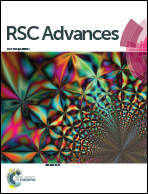Thermal reaction characteristics of dioxins on cement kiln dust
Abstract
Cement kiln dust is commonly recycled back into the production process. This results in elevated concentrations of polychlorinated dibenzo-p-dioxins and dibenzofurans (PCDD/Fs) in the flue gases of cement plants. The present study investigated the effects the reaction temperature, oxygen content, and origin of kiln dust had on the thermal reaction characteristics of PCDD/Fs. The concentration of 2,3,7,8-PCDD/Fs that were desorbed from the kiln dust decreased as the reaction temperature was increased and the higher temperature facilitated the degradation of PCDD/Fs. However, the oxygen content, which ranged from 6–21%, had only a minor impact on the thermal reaction characteristics of PCDD/Fs. Finally, the thermal reaction characteristics of PCDD/Fs were largely affected by the origin of the kiln dust; 1.2 pg I-TEQ g−1 was desorbed from kiln dust originating from a cement plant that co-processed refuse-derived fuel (RDF) and 47.5 pg I-TEQ g−1 was desorbed from kiln dust originating from a cement plant that co-processed hazardous waste. The study also found that PCDD/F formation pathways were dependent on the origin of the kiln dust; precursor synthesis dominated PCDD/F formation on the kiln dust collected from a cement plant that co-processed RDF, while de novo synthesis dominated the formation of PCDD/Fs on the remaining samples of kiln dust.



 Please wait while we load your content...
Please wait while we load your content...